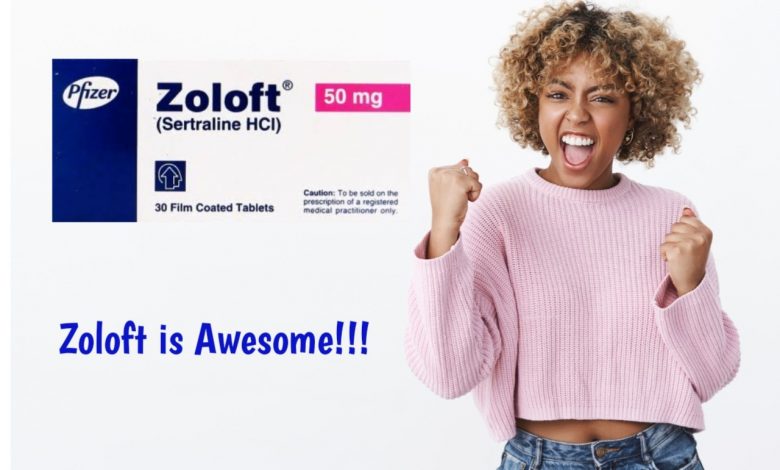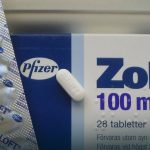Why Zoloft Is Awesome? A Review Of Patient’s Views

What is Zoloft?
Zoloft is an antidepressant that belongs to a group of drugs called selective serotonin reuptake inhibitors (SSRIs). Zoloft is used to treat some types of depression, premenstrual dysphoric disorder (PMDD), social anxiety disorder (SAD), obsessive-compulsive disorder (OCD), panic disorder (PD), and post-traumatic stress disorder (PTSD).
Mental health disorders account for several of the top causes of disability in established market economies, such as the U.S., worldwide, and include: major depression (also called clinical depression) and obsessive-compulsive disorder. Approximately about 18% of people ages 18- 54 in a given year, have an anxiety disorder in a given year. Anxiety disorders include panic disorder, obsessive-compulsive disorder (OCD), post-traumatic stress disorder (PTSD), generalized anxiety disorder (GAD), and phobias (social phobia, agoraphobia, and specific phobia).
How it works
Sertraline belongs to a class of drugs called selective serotonin reuptake inhibitors (SSRIs). A class of drugs is a group of medications that work in a similar way. These drugs are often used to treat similar conditions. This drug works by increasing the amount of serotonin, a natural substance in your brain, that helps maintain mental health balance. This can improve the symptoms of depression and anxiety.
Taking Zoloft
Knowing how to take Zoloft properly is important to make sure it works as effectively as possible. When taken correctly, Zoloft can make people feel less anxious or fearful, and it can reduce the urge to perform repeated tasks. It can improve sleep quality, appetite, energy levels, restore interest in daily life, and reduce unwanted thoughts and panic attacks.
Below we describe recommended dosages of Zoloft for the conditions it’s approved to treat, including information about what’s considered a high dose of Zoloft:
- Social anxiety disorder. For social anxiety disorder, the recommended starting dose of Zoloft is 25 milligrams (mg) once per day. Your medical professional may increase your dose week by week, if needed. Zoloft’s maximum dose for treating social anxiety is 200 mg once per day.
- Obsessive-compulsive disorder (OCD). To treat OCD in adults and children 13 years and older, the recommended starting dose of Zoloft is 50 mg once per day. For children 6 to 12 years old, the recommended starting dose is 25 mg once per day. If needed, your medical professional may increase your dose weekly. The maximum dose of Zoloft for OCD treatment is 200 mg once per day.
- Major depressive disorder (MDD). For MDD, the recommended starting dose of Zoloft is 50 mg once per day. Your medical professional may increase your dose each week if necessary. Zoloft’s maximum dose for treating MDD is 200 mg once per day.
- Panic disorder. For panic disorder, the recommended starting dose of Zoloft is 25 mg once per day. Your medical professional may increase your dose weekly as needed. The maximum dose of Zoloft for treating panic disorder is 200 mg once per day.
- Post-traumatic stress disorder (PTSD). For PTSD, the recommended starting dose of Zoloft is 25 mg once per day. Your medical professional may increase your dose weekly if needed. The maximum dose of Zoloft for treating PTSD is 200 mg once per day.
- Premenstrual dysphoric disorder (PMDD). For PMDD, your medical professional may prescribe continuous dosing, meaning that you’ll take Zoloft every day. Or they may prescribe intermittent dosing, which means you’ll only take Zoloft during the luteal phase* of your menstrual cycle.
- With continuous dosing, you’ll start with the lowest Zoloft dose, which is 50 mg once per day. Over time, your medical professional may increase your dosage up to the maximum of 150 mg per day.
- With intermittent dosing, you’ll start with the lowest dose of 50 mg once per day, taken only during the luteal phase* of your cycle. Over time, your medical professional may increase your dosage up to the maximum of 100 mg per day.
* The luteal phase of the menstrual cycle is the time after ovulation and before your period begins.

What some patients are saying about the medication?
Shawn sees Zoloft as a helpful medication he wrote “First off don’t stop taking Zoloft I learn it the hard way. I suffered from Postpartum Depression (PPD) severely after I had my son in 2009. I was hospitalized for 2-3 weeks. Zoloft did give me side effects the first couple of weeks like headaches, insomnia, loss of appetite, anxiety, panic, and diarrhea. It felt like I was a zombie for the first 3 weeks. My PPD gradually subsided in the 3rd week. I weaned off of it when my son was 3. Fast forward 2 years later I went through a rough patch and needed to be on Zoloft again. Then again I tapered off of it after 2 years. Then I had another child 10 years after 2009 and my PPD came back so I’m on it again. So far I’m trying to pull through this tough time again. Zoloft has helped me plenty of times and I hope this will help someone that is going through PPD.”
Zoloft is awesome says Terry who shared her experience thus “I have been taking Zoloft for 10 years. I take 100 mg daily. I have found that all of my symptoms have diminished. In times of real stress, I take an extra pill. All I can say is that none of the previous drugs I took helped me at all. I have depression and Post Traumatic Stress Disorder. At age 59 I still react to anything that sounds like gunfire. I spent 33 years working for the government, 2 in the Army the rest in law enforcement. I have found that I have no issues to deal with. I did once while out of the country lose my prescription while backpacking. It was horrible for me and my two friends. I take my pill in the evening before bed. No side effects at all. I found Zoloft to be a God send for me.”
The third reviewer equally had something good to say about the medication she wrote “Hi all. My name is Lauren I am 21. I have taken this medicine for 6 months. Here’s my story. 7 months ago I was having severe ANXIETY, with panic attacks and some mild depression because of it. I just wanted to feel better. I read review after review because I was scared to take an ANTIDEPRESSANT since I wasn’t depressed, and because I’m a natural person I question everything. All I can say is TRY IT. There will always be negative comments on any medication. This one saved me. I started on 25 mg it wasn’t enough. It took 6 weeks to feel 100% and in week 1 my anxiety was worse (didn’t know that was possible). I hope this helps you all because I was that person searching for what if’s.”
Esanj another Zoloft is awesome patient said “I have always been a “worrier” ever since I can remember. I believed I was going to stay this way my entire life until I was prescribed Zoloft 50mg. Starting a full-time job at 21, I used to constantly experience heart palpitations, I would ruminate constantly (day in and out), I began picking at my skin/nails. Life was absolutely exhausting for me. I saw a therapist who helped identify my anxiety triggers and I was given propranolol. These methods did help but not completely. My doctor started me on 25mg of sertraline and it increased my levels of anxiousness. Feeling hopeless I came across this page and read all your reviews and that gave me so much strength. I am currently on week 6 of Zoloft, taking 50mg. And l couldn’t be happier! I honestly feel like myself again, I can laugh at jokes now, I can rest easy and I’m not worrying at all anymore – it’s as if all the thoughts have been put on mute. Give it a go please, it’ll save your life”
Jamil says “This pill is a miracle for me. I’ve been taking it for about a month now, and within four days my nagging depression, anxiety, and paranoia were almost completely eliminated, which I had not expected at all. My Obsessive Compulsive Disorder has also calmed down significantly since taking it, and my overall demeanor has changed from angry and suspicious all the time, to happy and full of energy.”
Does Zoloft have any side Effects?
Generally, most patients tolerate Zoloft well, but it still has side effects that vary in severity. Common side effects of Zoloft are milder than first-generation antidepressants.
Minor side effects of Zoloft that typically decrease after the first or second week of use include:
• Aggression (in children)
• Diarrhea
• Dizziness
• Dry mouth
• Fever (in children)
• Headache
• Increased sweating
• Nausea
• Restlessness
• Sexual Dysfunction
• Sleepiness or insomnia
• Suicidal Thoughts
• Tremor
• Urinary incontinence (in children)
• Weight loss or gain
Some users experience sexual side effects, including problems with orgasm and ejaculatory delay, and impotence. These do not typically decrease with use.
FDA black box warning
Zoloft causes some younger users of the drug to report being suicidal. The FDA requires Zoloft and all antidepressants to carry a black box warning about the danger of suicide during the initial stages of treatment, especially in children. Clinical studies have shown that a small number of younger users of antidepressants, including sertraline, become suicidal.





